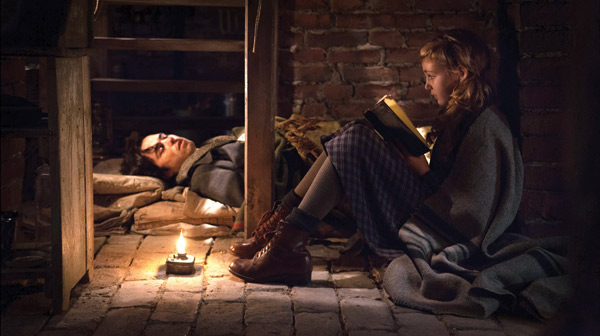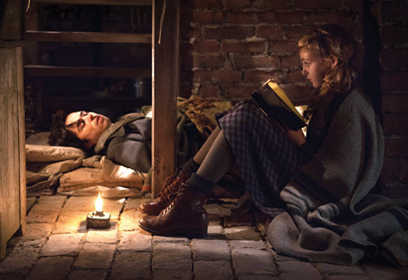 In Brian Percival’s The Book Thief, Liesel, played by Sophie Nélisse, reads to Max (Ben Schnetzer), a Jewish man in hiding from the Nazis. Photography courtesy of Twentieth Century Fox.
In Brian Percival’s The Book Thief, Liesel, played by Sophie Nélisse, reads to Max (Ben Schnetzer), a Jewish man in hiding from the Nazis. Photography courtesy of Twentieth Century Fox.
The Book Thief
directed by Brian Percival
Twentieth Century Fox
On the weekend after Thanksgiving, film producers release their Oscar hopefuls to multiplexes across America. Among this year’s was the American-German co-production The Book Thief. It surprised prognosticators and surged into the top ten at the box office.
The PG-13 film is based on a much-loved young-adult novel by Markus Zusak, whose parents—a German mother and Austrian father—immigrated after the Second World War to Australia, where the author was born and raised. He worked as a schoolteacher and published his first book for young readers in 1999. His writing almost at once won popular and critical success. The Book Thief, published in 2006, sold more than 2.5 million copies in the United States alone and held a spot on the New York Times young-adult best-seller list for almost five years. Parents, teachers, and librarians were enthusiasts too, and adult book groups took it up. Zusak had created a gentile version of Anne Frank, an innocent girl who suffered much and with whom readers could identify and empathize. They could even admire her. At age nine Zusak’s Liesel Meminger is orphaned and illiterate, but she learns to read and write and comes to love books. Unlike Anne Frank, though, the fictional Liesel survives the war, immigrates to Australia, and, like her creator, prospers as a writer who has learned the power of words for good and for evil.
Zusak tells us the novel had its beginnings in a childhood memory his mother had shared with him. The Nazis were herding Jews like cattle through the streets of her village, and people came out to watch. A teenage boy saw a starving old Jew who could barely walk being prodded along. He impulsively ran into the street and offered the old man a crust of bread, whereupon a Nazi guard mercilessly thrashed both of them. His mother’s memory stayed with him. In it he saw the essential ingredients of narrative: the good impulse of the boy, the evil of the Nazis, and the innocence of the child witness. It allowed him to imagine his mother’s childhood in Nazi Germany.
Amid wide acclaim on publication, the book’s only notable critic, the New York Times’s Janet Maslin, was put off by the tone: “Markus Zusak has not really written ‘Harry Potter and the Holocaust.’ It just feels that way.” The new film met a chorus of such critics, whose complaints have been dismissive—“[the] frolicsome tone feels dated and inappropriate”; it is “sentimental and not a little dull,” “a movie for middle-aged children,” “a misfire,” “plush, mawkish period drama”—and worse: it “robs the truth from an evil time” and is “a shameless piece of Oscar-seeking Holocaust kitsch.”
Nonetheless, audiences seem to love it. The movie takes you on an emotional roller coaster; it wrings your heart and makes you weep. But if you step back and reflect on your experience, you might decide you have just watched the Walt Disney version of the Holocaust from the German point of view. What happened?
The first problem facing the filmmakers was what to do about “Death.” In the novel, Zusak chose Death, a metaphysical character, as the narrator. Death takes no side in the war or the Holocaust. He is impartial as he gathers up the souls of the dying, whether they are Nazis or Jews, adults or children. Despite Death’s impartiality, he takes an interest in Liesel, and, as he looks down on the Third Reich, he wonders at the beauty and ugliness found in members of the same human species.
Death provides a droll introduction to the novel: “It is just a small story, really, about, among other things: a girl, some words, an accordionist, some fanatical Germans, a Jewish fist fighter, and quite a lot of thievery.” Of course the book does not tell a small story. It has many complicated subplots, infamous historical events, and poetic prose woven into a narrative that resists trivialization.
Death as a narrator might challenge a young reader, but Death in a film could stir up real anxiety and even cause nightmares. The British director Brian Percival, who earned his reputation helming episodes of Downton Abbey, made Death a kindly gentleman who speaks in a plummy English accent. His opening lines seem addressed to sensitive preteens who typically go through a phase of obsession with the fear of dying. I paraphrase: “Why do humans get so frantic about dying? It does no good. Everyone is going to die.” At tragic moments throughout the film, this Downton Abbey Death dispenses such reassurance as he collects souls. The character is voiced by Roger Allam, a distinguished stage actor. The sound of his speech dispels the horror he brings.
Allam’s Death moves the plot along, but the star of The Book Thief is Liesel (Sophie Nélisse). She is nine when we first meet her in the novel. Her parents are Lutherans, not Jews, and they have been persecuted in Hitler’s Germany because they are communists. Her father has already disappeared, and her mother is forced to hand her children over to foster care. On the train to Munich, where the children will be left, Liesel watches as her brother dies. At his burial she sees a book and impetuously steals it, even though she cannot read. It seems as though the book is a symbolic compensation for her loss. The novel’s Liesel is a traumatized child, abandoned by her mother and witness to her brother’s death. And, not surprisingly, she shows psychological symptoms besides stealing books: bed wetting and nightmares that wake her in terror. She is a wounded creature, and her problems are not those working-class foster parents, who take in children for the money, would welcome.
Death is a kindly gentleman who speaks in a plummy English accent.
The filmmakers eliminated most of Liesel’s psychological troubles. When she meets her foster parents, the Hubermanns, there are no weeping hysterics. She sits in the car that brought her and ignores Rosa Hubermann’s demand that she get out. Rosa (Emily Watson) is the gruff, bossy, cursing housewife with a heart of gold. Her husband, Hans Hubermann (Geoffrey Rush), is the target of most of Rosa’s abuse. The kind, endlessly patient man is, like Zusak’s own father, a house painter. Hans is also an accordion player who knows instinctively how to deal with Liesel. He holds out his hand and greets her with “your majesty.” Their emotional bond is immediate and will grow. This Liesel is not wounded and is not a bed wetter. One senses immediately her inner strength and resolve. Nélisse, who is beautiful without being pretty, does a wonderful job even with the fake German accent the actors were required to employ. One can easily imagine her—an acclaimed emerging actress who aspired to be an Olympic gymnast before auditioning for the film—doing back flips on the balance beam. Her Liesel is resolute, beguiling, innocent, and feisty all at once. She is a tomboy and finds an instant boyfriend, Rudi, who will do anything for a kiss.
In the film Liesel’s psychological trauma comes not from the Holocaust but from school. On the first day, the teacher calls her to the blackboard to write her name. This book thief is illiterate and produces only “XXX” to the derisive laughter of her classmates. The class bully, the young Nazi of the film, ridicules her in the schoolyard. Without any hesitation our heroine punches him out. Soon she is on the boys’ soccer team and has earned the respect of her classmates.
But the task of teaching her to read and write falls to her foster father. One night Hans discovers the book Liesel picked up at her brother’s grave; it is a gravedigger’s manual. He asks if it is hers, and, Liesel, who never loses her aplomb, replies, “It was not always mine.” Hans begins teaching Liesel to read by explaining that he is not a good reader himself, that they will have to work together. Learning together, helping each other, deepens their bond of love, which empowers Liesel and in turn gratifies Hans’s fatherly impulses. As the film unfolds, it becomes clear that both foster parents truly love their daughter.
But this is a film about the Holocaust, so it must include a Jew. Enter Max (Ben Schnetzer), whose father saved Hans’s life during the First World War and gave the poor man his precious accordion. Fleeing the Nazis, Max arrives in the middle of the night, and Hans feels obligated to hide him in the cellar. There, Max, a sickly intellectual and not the fist fighter of the book, takes up the task of educating Liesel. Confined to the cellar for weeks on end, Max cannot see the sky or experience the day. He begs Liesel to describe it for him. She begins with platitudes, and Max interrupts, encouraging her to describe how she herself saw the day. Liesel’s poetic imagination is set free, and she is launched on a trajectory as a word-loving writer. Her talent is crafted not just for herself, but for Max, who is eventually captured but survives Dachau and returns to the village to find her after the war. Zusak the pedagogue wanted his complex novel to be challenging and open-ended, and indeed its readers vigorously debate on blogs whether Liesel marries Max. In the simplified film version, the open ending doesn’t invite discussion; it just bewilders, leaving the audience wondering what happened.
The screenplay cleans out most of history’s ugly reality, but it does cover the notorious events of the era that the book describes: Hitler’s temper tantrum when Jesse Owens won Olympic gold, Kristallnacht, the Nazi book burnings, the roundup of the Jews, and the outbreak of World War II. That grim history goes by like a slide show, and the cinematographer, Florian Ballhaus, seems more interested in the aesthetic of the mise en scène than in the horror of what is taking place. In the novel it was somehow ironically fitting that the Hubermann’s live on Himmel (Heaven) Street, but in the film it strikes an absurdly saccharine note.
In the end, though, the relative virtues of Zusak’s novel do little to distance it from the disturbing cultural phenomenon the film represents: the appetite for a Holocaust narrative far removed from the one told by the Jews who experienced it. Within a decade, almost all the Jews of Europe who survived and vowed never to forget will be dead. Their account is fading from historical consciousness, and the sacred memory of the six million consecrated in Claude Lanzmann’s great film Shoah is threatened less by Holocaust deniers (as it once was) than by new generations who have no reason to care about it. For most of the young adults who read and loved Zusak’s novel, it was their first exposure to the Holocaust. The film will reach millions more as the primary vehicle of that history.
The Book Thief premiered at the Holocaust Museum in Washington, D.C. where it got a standing ovation. There was a special screening in Texas for former President George H.W. Bush, his wife Barbara, and their friends. They gave it thumbs up, and Barbara thought it deserved particular credit for addressing illiteracy. At about the same time, an addendum to Shoah, Lanzmann’s The Last of the Unjust, screened at the New York Film Festival. Most of America barely noticed—just as they seem not to have noticed The Book Thief is less about the Holocaust than about forgetting it.







